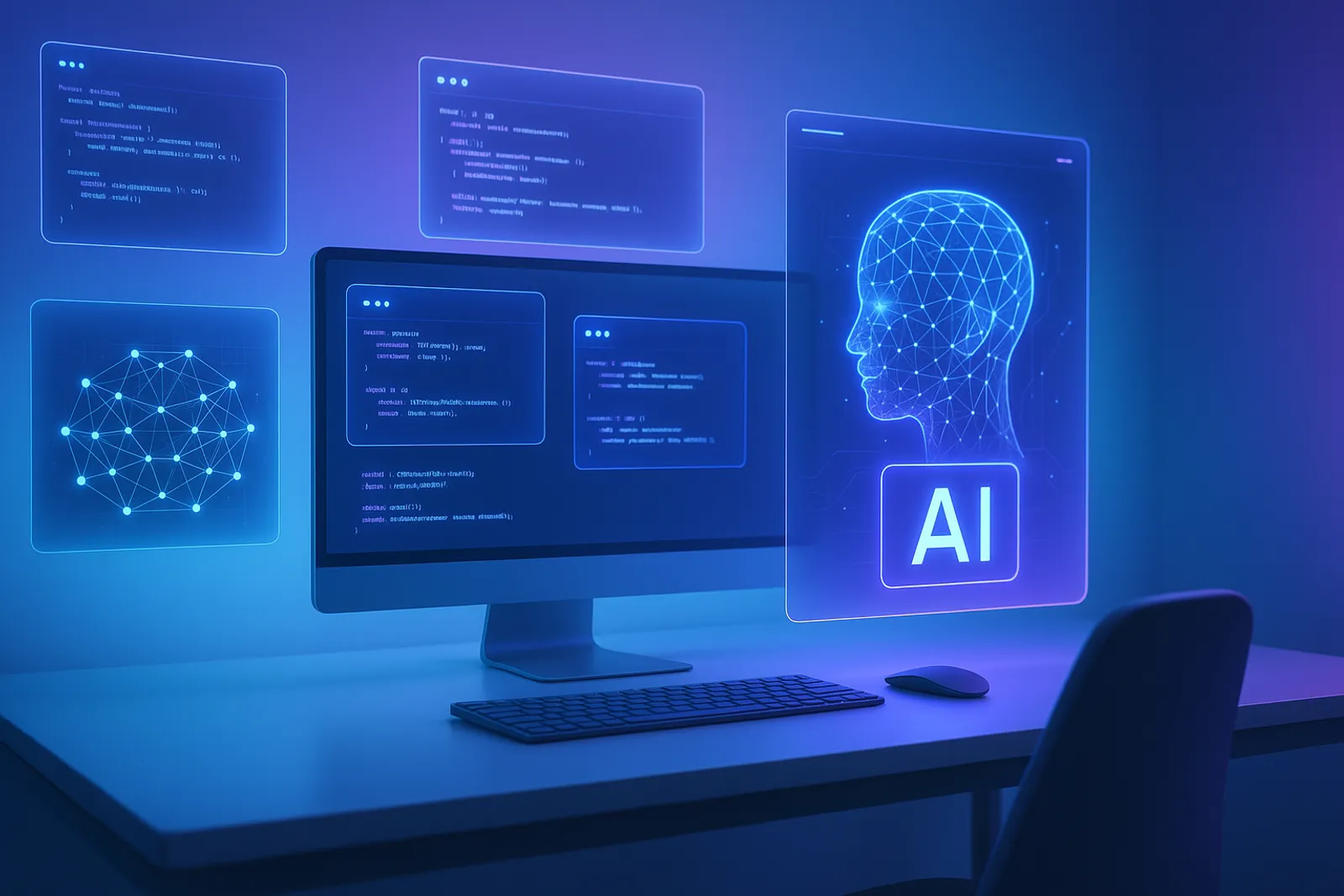The Future of AI in Software Development: What Every Developer Should Know
Explore the future of AI in software development. From autonomous coding to AI-powered architectures, discover what's coming next and how developers can prepare for the AI revolution.

The Future of AI in Software Development: What Every Developer Should Know
We’re standing at the threshold of a fundamental transformation in software development. AI is not just changing how we write code—it’s reshaping the entire development ecosystem, from how we conceive applications to how they evolve and maintain themselves. Here’s what the future holds for developers in an AI-powered world.
The AI Development Revolution is Just Beginning
Current AI tools like GitHub Copilot and ChatGPT are impressive, but they’re just the first wave. The next decade will bring capabilities that seem like science fiction today:
- Autonomous development agents that can build entire applications from natural language specifications
- Self-evolving codebases that improve and adapt without human intervention
- AI pair programmers with deep understanding of business context and technical requirements
- Intelligent architectures that automatically optimize for performance, security, and maintainability
Emerging AI Development Paradigms
1. Natural Language Programming
The future of programming might not involve traditional code at all:
"Create a social media application with user authentication, real-time messaging,
photo sharing with AI-powered content moderation, and an algorithmic feed that
prioritizes meaningful connections over engagement metrics. The app should be
accessible, privacy-focused, and include mental health safeguards."
AI Translation to Implementation:
- Generates complete architecture diagrams
- Creates database schemas and API specifications
- Writes frontend and backend code
- Implements testing strategies
- Sets up deployment pipelines
- Configures monitoring and observability
2. AI-First Architecture Patterns
// AI-Native Application Structure
class AIApplication {
constructor() {
this.aiOrchestrator = new AIOrchestrator();
this.adaptiveComponents = new AdaptiveComponentRegistry();
this.intelligentRouting = new AIRoutingEngine();
this.selfOptimization = new PerformanceAI();
}
async handleRequest(request) {
// AI analyzes request context and user behavior
const context = await this.aiOrchestrator.analyzeContext(request);
// AI selects optimal component versions
const components = await this.adaptiveComponents.selectOptimal(context);
// AI determines best processing path
const route = await this.intelligentRouting.optimize(request, context);
return this.processWithAI(request, components, route);
}
}
3. Autonomous Development Agents
class AutonomousDevAgent {
async developFeature(specification) {
const analysis = await this.analyzeRequirements(specification);
const architecture = await this.designArchitecture(analysis);
const implementation = await this.generateCode(architecture);
const tests = await this.createTests(implementation);
const deployment = await this.setupDeployment(implementation);
// Agent monitors and improves the feature continuously
this.continuousImprovement(implementation);
}
async handleBugReport(bug) {
const rootCause = await this.diagnoseIssue(bug);
const fix = await this.generateFix(rootCause);
const validation = await this.validateFix(fix);
if (validation.confidence > 0.95) {
await this.deployFix(fix);
} else {
await this.escalateToHuman(bug, fix, validation);
}
}
}
The Evolving Role of Developers
From Code Writers to AI Orchestrators
Traditional Developer Skills (Still Important):
- Problem-solving and logical thinking
- Understanding of system architecture
- Knowledge of data structures and algorithms
- Debugging and optimization skills
Emerging AI-Era Skills:
AI Prompt Engineering:
- Crafting effective instructions for AI systems
- Understanding AI model capabilities and limitations
- Optimizing AI-human collaboration workflows
AI Model Integration:
- Selecting appropriate AI tools for specific tasks
- Combining multiple AI capabilities into cohesive solutions
- Managing AI model lifecycle and updates
Intelligent System Design:
- Architecting applications that leverage AI effectively
- Designing feedback loops for continuous AI improvement
- Balancing automation with human oversight
New Developer Archetypes
1. AI Application Architects
Responsibilities:
- Design systems that effectively leverage AI capabilities
- Create architectures that can evolve with AI advancements
- Balance AI automation with human control and oversight
- Ensure AI systems are ethical, fair, and transparent
Skills Required:
- Deep understanding of AI/ML capabilities and limitations
- System design and architecture expertise
- Knowledge of AI ethics and responsible AI principles
- Business strategy and requirements analysis
2. AI Tool Integrators
Responsibilities:
- Evaluate and select AI tools for development workflows
- Create seamless integrations between AI tools and existing systems
- Optimize AI tool chains for maximum productivity
- Train teams on effective AI tool usage
Skills Required:
- Extensive knowledge of AI development tools
- API integration and workflow automation
- Change management and team training
- Performance monitoring and optimization
3. AI Quality Engineers
Responsibilities:
- Ensure AI-generated code meets quality standards
- Develop testing strategies for AI-enhanced applications
- Monitor AI system performance and reliability
- Identify and mitigate AI bias and errors
Skills Required:
- Advanced testing methodologies
- AI model evaluation and validation
- Statistical analysis and data science
- Risk assessment and mitigation
Predictions for the Next 5-10 Years
2025-2027: Enhanced Collaboration
AI Coding Assistants Become Ubiquitous
Development Environment Evolution:
- Every IDE includes sophisticated AI pair programming
- AI assistants understand project context and business requirements
- Real-time code review and optimization suggestions
- Automatic generation of documentation and tests
Impact on Developers:
- 50% reduction in routine coding tasks
- Increased focus on architecture and business logic
- Higher quality code with fewer bugs
- Faster feature development and iteration
Natural Language Interfaces Mature
Natural Language Development:
- Detailed application specifications in plain English
- AI translates requirements into technical implementations
- Conversational debugging and optimization
- Voice-controlled development workflows
New Workflows:
Developer: "The user registration is too slow"
AI: "I've identified the bottleneck in the email validation service.
Shall I implement caching and optimize the database queries?"
2028-2030: Autonomous Development
Self-Improving Applications
Autonomous Application Evolution:
- Applications that monitor their own performance
- Automatic optimization based on usage patterns
- Self-healing systems that fix bugs and vulnerabilities
- Proactive feature development based on user behavior
Developer Role Shift:
- From writing code to guiding AI systems
- Focus on high-level strategy and user experience
- Oversight of autonomous development processes
- Creative problem-solving and innovation
AI-Powered Code Generation at Scale
Enterprise AI Development:
- Entire applications generated from business requirements
- AI architects that design optimal system architectures
- Automatic integration with existing enterprise systems
- Compliance and security built-in by default
Business Impact:
- 90% reduction in development time for standard applications
- Democratization of software development
- Focus shifts to unique business value and innovation
- Traditional programming becomes a specialized skill
2030+: The Post-Code Era
Beyond Traditional Programming
Post-Code Development:
- Intent-based programming replaces syntax-based coding
- AI understands business goals and automatically implements solutions
- Humans focus on creativity, strategy, and ethical considerations
- Programming becomes as accessible as using any other tool
Society-Wide Impact:
- Anyone can create sophisticated software applications
- Traditional software development jobs transform completely
- New focus on AI ethics, governance, and oversight
- Innovation accelerates exponentially
Preparing for the AI-Powered Future
Essential Skills for AI-Era Developers
1. AI Literacy and Prompt Engineering
Master AI Interaction:
- Learn to craft effective prompts for different AI models
- Understand when and how to use various AI tools
- Develop intuition for AI capabilities and limitations
- Practice iterative refinement of AI outputs
Practical Steps:
- Use AI coding assistants daily in your work
- Experiment with different prompt techniques
- Study AI model documentation and best practices
- Join AI developer communities and forums
2. System Thinking and Architecture
Develop Systems Perspective:
- Focus on how components interact and integrate
- Understand data flow and system boundaries
- Design for scalability, maintainability, and evolution
- Learn to architect AI-enhanced applications
Learning Path:
- Study distributed systems and microservices
- Practice designing systems with AI components
- Learn about AI model deployment and monitoring
- Understand MLOps and AI infrastructure
3. Business and Domain Understanding
Bridge Technology and Business:
- Understand the problem domain deeply
- Translate business requirements into technical solutions
- Communicate effectively with non-technical stakeholders
- Focus on user value and business outcomes
Development Areas:
- Learn business analysis and requirements gathering
- Study user experience design principles
- Practice stakeholder communication
- Understand product management fundamentals
Career Strategy for the AI Era
1. Embrace AI as a Collaborative Partner
AI-Human Partnership:
- View AI as an intelligent assistant, not a threat
- Learn to leverage AI strengths while compensating for weaknesses
- Develop workflows that maximize AI-human collaboration
- Stay curious about new AI capabilities and tools
Mindset Shift:
From: "How do I write this code?"
To: "How do I get the best outcome using AI assistance?"
2. Focus on Uniquely Human Skills
Irreplaceable Human Capabilities:
- Creative problem-solving and innovation
- Emotional intelligence and empathy
- Ethical reasoning and moral judgment
- Complex communication and persuasion
- Strategic thinking and long-term planning
Development Focus:
- Improve communication and leadership skills
- Study ethics and philosophy
- Develop business acumen and strategic thinking
- Practice creative and design thinking
3. Continuous Learning and Adaptation
Adaptive Career Development:
- Stay informed about AI developments and trends
- Experiment with new AI tools and techniques
- Build a network of AI-savvy professionals
- Contribute to open source AI projects
Learning Resources:
- Follow AI research papers and conferences
- Join AI developer communities and forums
- Take courses on AI, machine learning, and prompt engineering
- Attend workshops and meetups on AI development
Challenges and Considerations
Ethical Implications
Key Concerns:
- AI bias and fairness in automated development
- Job displacement and economic impact
- Privacy and security in AI-enhanced applications
- Accountability for AI-generated code and decisions
Developer Responsibility:
- Understand AI ethics and responsible development
- Advocate for transparent and fair AI systems
- Consider societal impact of AI applications
- Participate in discussions about AI governance
Technical Challenges
Complex Problems:
- Ensuring reliability and safety of AI-generated code
- Managing complexity in AI-enhanced systems
- Debugging and troubleshooting AI-driven applications
- Maintaining human oversight and control
Solution Approaches:
- Develop robust testing and validation frameworks
- Create clear boundaries between AI and human responsibilities
- Implement monitoring and alerting for AI system behavior
- Establish rollback and failsafe mechanisms
Skills Gap and Education
Current Gaps:
- Limited AI education in traditional computer science curricula
- Insufficient training on AI tool usage and best practices
- Lack of interdisciplinary programs combining AI and software development
- Need for continuous professional development
Solutions:
- Universities updating curricula to include AI development
- Professional certification programs for AI-assisted development
- Corporate training programs on AI tools and techniques
- Online learning platforms with practical AI development courses
The Opportunity Ahead
The future of software development is not about AI replacing developers—it’s about AI amplifying human creativity and capability. Developers who embrace this change will find themselves more productive, creative, and valuable than ever before.
The AI-Enhanced Developer of 2030:
- Solves complex business problems with AI assistance
- Focuses on innovation and creative solutions
- Designs systems that leverage AI effectively
- Bridges the gap between technology and human needs
- Ensures AI systems are ethical, fair, and beneficial
Conclusion
The transformation of software development by AI is inevitable and accelerating. Rather than fearing this change, developers should embrace it as an opportunity to evolve their skills and increase their impact.
The developers who thrive in the AI era will be those who:
- Learn to work effectively with AI tools
- Focus on uniquely human skills like creativity and ethics
- Understand business problems and user needs
- Continuously adapt to new technologies and paradigms
The future belongs to developers who can orchestrate AI capabilities to create solutions that truly matter. Start preparing today by experimenting with AI tools, developing system thinking skills, and focusing on the human elements of software development that AI cannot replace.
The age of AI-assisted development is here. The question isn’t whether you’ll work with AI—it’s how effectively you’ll collaborate with it to build the future.
Stay ahead of AI development trends with our curated AI tools directory at Bitstream.
Get the latest updates
Level up your API with our latest insights, resources and updates from Bitstream.
Join the Future with Bitstream
Sign up now to get analytics across your APIs in minutes.
Sign Up FreeNo credit card required.
